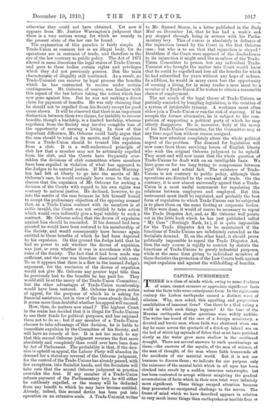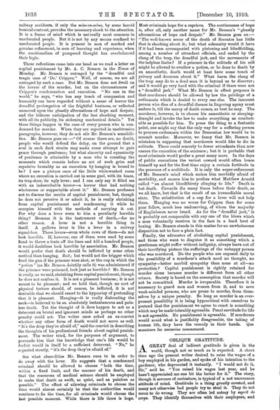CAPITAL PUNISHMENT. T HERE is a class of minds which, owing
to some deadness of sense, cannot measure or appreciate significant facts unless the facts take some cataclysmic form. In the eigli teenth century the Lisbon earthquake caused a distinct wave of atheism. Why, men asked, this appalling and purp33eless annihilation of innocent lives ? Can there be a Gad ruling a world in which such things happen ? At the time of the Messina earthquake similar questions were widely audible. The writer has heard of the case of a foreign missionary, a devoted and heroic man, whose faith was shattered when one day he came across the spectacle of a dried-up inland sea on the bed of which lay myriads of fishes that must have perished slowly as the water grew more shallow in the continued drought. There are several answers to such questionings as these,—the answers of the mystic, of the man of science, of the man of thought, of the man whose faith transcends all the accidents of our material world. But it is not our business to discuss these ; we indicate for our purpose only the existence of the mental habit which in all ages has been shocked into revolt by a sudden immense catastrophe, but has been contented to accept without misgiving the gradual accumulation of facts which in their stun total were infinitely more significant. These things escaped attention because they presented no unexpected challenge to the nerves. The frame of mind which we have described appears in relation to very much lesser things than earthquakes or terrible fires or railway accidents, if only the ease-en-seine, by some -horrid ironical contrast, provides the necessary shock to the attention. It is a frame of mind which is naturally most common in 'uneducated people. Rat it is not by any means confined to uneducated people. It is present in men of marked and genuine refinement, in men of learning and experience, when the emotionalism of pampered thought has overbalanced their logic.
These reflections came into our head as we read a letter on capital punishment by Mr. A. C. Benson in the Times of Monday. Mr. Benson is outraged by the " dreadful and tragic case of 'Dr.' Crippen." Well, of course, we are all outraged by such a case. But Mr. Benson does not dwell on the horror of the murder, but on the circumstances of Crippen's condemnation and execution. "No one in the world," he says, "who has any touch of compassion and humanity can have regarded without a sense of horror the dreadful prolongation of the frightful business, or reflected unmoved upon the ghastly alternations of hope and despair, and the hideous anticipation of the last shocking moment, with all its publicity, its sickening mechanical details." Yet these things happen in the case of every person who is con- demned for murder. When they are reported in unobtrusive paragraphs, however, they do not stir Mr. Benson's sensibili- ties. Mr. Benson goes on :—" Of course there are, no doubt, people who would defend the delay, on the ground that a soul in such dark straits may make some attempt to gain peace through penitence; but what sincerity and equanimity of penitence is attainable by a man who is counting the moments which remain before an act of such grim and repulsive brutality as an execution by hanging is bound to be ? I saw a picture once of the little whitewashed room where an execution is carried out in some gaol, with its beam, its trap-door, its ugly lever; and I can only say it filled me -with an indescribable horror—a horror that had nothing wholesome or supportable about it." Mr. Benson professes not to discuss the merits of capital punishment, but, though he does not perceive it or admit it, he is really shrinking from capital punishment and condemning it while he occupies himself with the methods of carrying it out. For why does a lever seem to him a peculiarly horrible thing ? Because it is the instrument of death,—for no other reason. A lever is not a horrible thing in itself. A gallows lever is like a lever in a railway signal-box. There levers—even whole rows of them—do not look horrible. If, however, one of them were used by some fiend to throw a train off the lines and kill a hundred people, it would doubtless look horrible by association. Mr. Benson would prefer that death should be inflicted by some other method than hanging. Soil; but would not the trigger which fired the gun if the prisoner were shot, or the cup in which the " potion " (as Mr. Benson daintily calls it) was administered if the prisoner were poisoned, look just as horrible ? Mr. Benson is really, as we said, shrinking from capital punishment, though he does not confess it. It is not a pleasant business; it is not meant to be pleasant ; and we hold that, though no sort of physical torture should, of course, be inflicted, it is not desirable that we should resort to the hypocrisy of pretending that it is pleasant Hanging—it is really dislocating the neck—is believed to be an absolutely instantaneous and pain- less death. Yet the thought of it does happen to act as a deterrent on brutal and ignorant minds as perhaps no other penalty could act. The writer once asked an ex-convict whether any other form of death would not serve as well. " It's the drop they're afraid of," said the convict in describing the thoughts of his professional friends about capital punish- ment. The writer tried, for the purposes of argument, to persuade him that the knowledge that one's life would be forfeit would in itself be a sufficient deterrent. "No," he repeated stoutly, " it's the drop they're afraid of."
See what absurdities Mr. Benson runs to in order to do away with the lever. He suggests that a condemned criminal should be allowed to choose "both the time, within a fixed limit, and the manner of his death, and that the resources of medical science should be employed to make that death as swift, as quiet, and as painless as possible." The effect of allowing criminals to choose the time would almost certainly be that the authorities would continue to fix the time, for all criminals would choose the last possible moment. While there is life there is hope.
Most criminals hope for a reprieve. The continuance of hope is, after all, only another name' for Mr. Benson's "ghastly alternations of hope and despair." Mr. Benson goes on:- " The well-known scene of the death of Socrates has little that is shocking about it; but what solemnity would it have if it had been accompanied with pinioning and blindfolding, among a number of attendant officials, and ended by the clang of the trap, the dreadful jerk, and the movements of the helpless limbs P If a prisoner in the solitude of his cell might be allowed to swallow a potion, or be done to death by an anaesthetic, death would at least have some touch of privacy and decorum about it." What harm the clang of the trap may do to a dead man it is beyond us to discover; and it would go very hard with the criminal if there were not a " dreadful jerk." What Mr. Benson in effect proposes is that murderers should be allowed by law the privilege of a euthanasia which is denied to every one else. The innocent person who dies of a dreadful disease in lingering agony must endure it, till the mercy of death comes, as best he may. The murderer, however, is to choose his anaesthetic or sleeping- draught and invoke the law to make everything as comfort- able as possible for him. To press the thing to a fantastic point, one might say that the only way for a suffering person to procure euthanasia within the Bensonian law would be to commit murder. Moreover, we fancy that Mr. Benson is mistaken in supposing that murderers would like to die in solitude. Them could scarcely be fewer attendants than now ensure the execution of the sentence ; but it is probable that most criminals would prefer a great many more. In the days of public executions the veriest coward would often brace himself up and for the first time enjoy a certain fortitude in the presence of a multitude. It is only the super-refinement of Mr. Benson's mind which makes him morbidly afraid of morbidity, and causes him to profess what Matthew Arnold called " an almost bloodthirsty clinging to life." Death is but death. Cowards die many times before their death, as we all know, but that is the result of an irremediable moral state. The substitution of a cup for a lever will not help them. Hanging was no worse for Crippen than for some poor fellow, much less undeserving, of whom the majority of Englishmen never heard. As for the " dreadful jerk," it is probably not comparable with any one of the blows which a man voluntarily receives in the face in a hard bout of boxing. Mr. Benson stands in this matter for an unwholesome disposition not to face a plain fact.
Finally, the advocates of abolishing capital punishment, and those who want to disguise it as something which a gentleman might suffer without indignity, always leave out of their terrifying picture the sufferings of the unhappy person who was murdered. Do the people who are exposed daily to the possibility of a murderer's attack need no thought, no sympathy—better morbid sympathy than none at all—no protection P Capital punishment is rightly retained for murder alone because murder is different from all other crimes. Society is based on the assumption that murder will not be committed. Murder is irreparable. Therefore it is necessary to guard men and women from it, and to save weak-minded persons, who are prone to murder, from them. selves by a unique penalty. So long as murder is an ever- present possibility it is being hypocritical with ourselves to pretend that the punishment we agree to exact is something which may be made tolerably agreeable. Penal servitude for life is not agreeable. No punishment is agreeable. If murderers would avoid what is justifiably disagreeable, the taking of human life, they have the remedy in their hands. Qua messieurs les assassins commencen&



























































 Previous page
Previous page